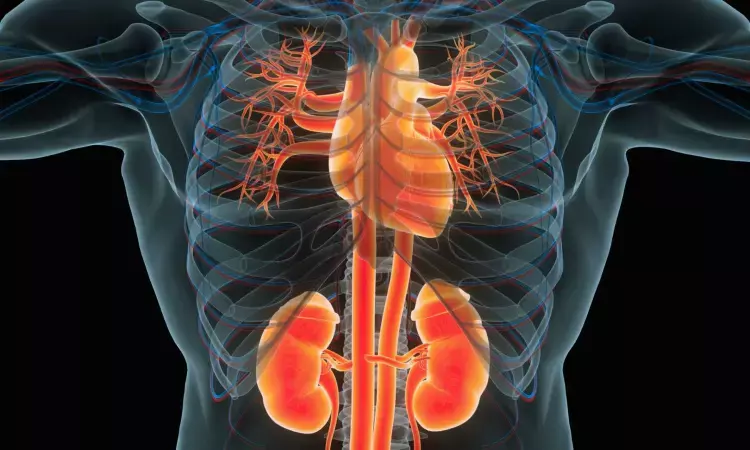- Home
- Medical news & Guidelines
- Anesthesiology
- Cardiology and CTVS
- Critical Care
- Dentistry
- Dermatology
- Diabetes and Endocrinology
- ENT
- Gastroenterology
- Medicine
- Nephrology
- Neurology
- Obstretics-Gynaecology
- Oncology
- Ophthalmology
- Orthopaedics
- Pediatrics-Neonatology
- Psychiatry
- Pulmonology
- Radiology
- Surgery
- Urology
- Laboratory Medicine
- Diet
- Nursing
- Paramedical
- Physiotherapy
- Health news
- Fact Check
- Bone Health Fact Check
- Brain Health Fact Check
- Cancer Related Fact Check
- Child Care Fact Check
- Dental and oral health fact check
- Diabetes and metabolic health fact check
- Diet and Nutrition Fact Check
- Eye and ENT Care Fact Check
- Fitness fact check
- Gut health fact check
- Heart health fact check
- Kidney health fact check
- Medical education fact check
- Men's health fact check
- Respiratory fact check
- Skin and hair care fact check
- Vaccine and Immunization fact check
- Women's health fact check
- AYUSH
- State News
- Andaman and Nicobar Islands
- Andhra Pradesh
- Arunachal Pradesh
- Assam
- Bihar
- Chandigarh
- Chattisgarh
- Dadra and Nagar Haveli
- Daman and Diu
- Delhi
- Goa
- Gujarat
- Haryana
- Himachal Pradesh
- Jammu & Kashmir
- Jharkhand
- Karnataka
- Kerala
- Ladakh
- Lakshadweep
- Madhya Pradesh
- Maharashtra
- Manipur
- Meghalaya
- Mizoram
- Nagaland
- Odisha
- Puducherry
- Punjab
- Rajasthan
- Sikkim
- Tamil Nadu
- Telangana
- Tripura
- Uttar Pradesh
- Uttrakhand
- West Bengal
- Medical Education
- Industry
Earlier treatment with SGLT2 inhibitor canagliflozin confers cardiorenal benefits in type 2 diabetes

Canada: A pooled analysis of the CANVAS Program and CREDENCE trials showed that earlier treatment with canagliflozin confers consistent cardiorenal benefits to individuals with type 2 diabetes (T2D). The findings were published online in Diabetes Care on January 22 2024.
"Canagliflozin imparted benefits in patients with type 2 diabetes across all time intervals, with no heterogeneity for kidney or cardiovascular (CV) events, including the regression and progression of albuminuria within the first five years of diabetes," the researchers reported.
The study found that for patients with T2D and high CV risk or moderate to severe albuminuria, canagliflozin reduced the incidence of CV and kidney events consistently, irrespective of diabetes duration. Canagliflozin increased albuminuria regression and reduced the incidence of albuminuria progression, regardless of diabetes duration, including within the first five years of type 2 diabetes diagnosis.
Type 2 diabetes is the most common reason for kidney replacement therapy requiring dialysis. There is persistent residual kidney risk from T2D, even after achieving blood pressure (BP) control, including the use of renin-angiotensin-aldosterone system inhibitors. It is unknown whether the duration of type 2 diabetes modifies the effects of sodium–glucose cotransporter 2 inhibitor canagliflozin on CV and kidney outcomes.
To address the benefit of SGLT2 inhibitors on kidney and cardiovascular outcomes, Sheldon W. Tobe, Northern Ontario School of Medicine, Sudbury, Ontario, Canada, and colleagues conducted a posthoc analysis to evaluate the impact of canagliflozin versus placebo on CV and kidney events in participants with type 2 diabetes and high CV risk and/or CKD, according to baseline diabetes duration.
The post hoc analysis of the Evaluation of the Effects of Canagliflozin on Renal and Cardiovascular Outcomes in Participants With Diabetic Nephropathy (CREDENCE) trial (N = 4,401) and the CANagliflozin cardioVascular Assessment Study (CANVAS) Program (N = 10,142) evaluated hazard ratios using Cox proportional hazards for the effects of canagliflozin on kidney and CV outcomes, including progression and regression of albuminuria over 5-year intervals of disease duration.
The study revealed the following findings:
- Canagliflozin had a range of benefits across intervals of diabetes duration, with no heterogeneity for major adverse CV events, CV death or heart failure hospitalization, and kidney failure requiring therapy or doubling serum creatinine.
- Canagliflozin reduced albuminuria progression and increased albuminuria regression with no interaction across all diabetes duration subgroups.
"This analysis highlights the clinical importance of reducing kidney and cardiovascular outcomes even for people with diabetes of short duration," the researchers wrote, adding that, "these findings suggest that clinicians should not wait for rising albuminuria or declining kidney function to initiate SGLT2 inhibitor therapy, but rather consider earlier intervention in people at highest risk of developing CKD or CV events."
Reference:
Sheldon W. Tobe, Thomas A. Mavrakanas, Harpreet S. Bajaj, Adeera Levin, Navdeep Tangri, April Slee, Brendon L. Neuen, Vlado Perkovic, Kenneth W. Mahaffey, Wally Rapattoni, Fernando G. Ang; Impact of Canagliflozin on Kidney and Cardiovascular Outcomes by Type 2 Diabetes Duration: A Pooled Analysis of the CANVAS Program and CREDENCE trials. Diabetes Care 2024; dc231450. https://doi.org/10.2337/dc23-1450
Dr Kamal Kant Kohli-MBBS, DTCD- a chest specialist with more than 30 years of practice and a flair for writing clinical articles, Dr Kamal Kant Kohli joined Medical Dialogues as a Chief Editor of Medical News. Besides writing articles, as an editor, he proofreads and verifies all the medical content published on Medical Dialogues including those coming from journals, studies,medical conferences,guidelines etc. Email: drkohli@medicaldialogues.in. Contact no. 011-43720751


